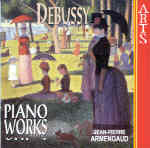Because Debussy starts with sound, it’s difficult to endure the drab, dynamically restricted engineering throughout these performances. Jean-Pierre Armengaud’s uneven pianism and inconsistent interpretations don’t help matters. True, he has good moments: nice dynamic gradations and sparkling repeated notes in La sérénade interrompue, an appropriately stormy Ce qu’a vu le vent d’ouest, unusual deliberation and clarity in Brouillards, plus excellently varied chord voicing in Canope. Conversely, Minstrels and Général Lavine-eccentric suffer from spongy syncopations, and the murmuring, repeating two-note phrases in Le vent dans la plaine and Les collines d’Anacapri are not well controlled.
Then there’s as stiff and unsexy a La puerta del vino as you’re likely to hear, along with a flat, undifferentiated Ondine. Des pas sur la neige sounds static and frozen rather than sparse and fluid. If you want a modern, well engineered recording that fits both books of Debussy’s Preludes on a single disc, Vladimir Viardo (ProPiano) or Joan Rowland (SurroundedBy) will adequately suit your needs. Otherwise, the double-CD set reference versions remain my first choices.
































